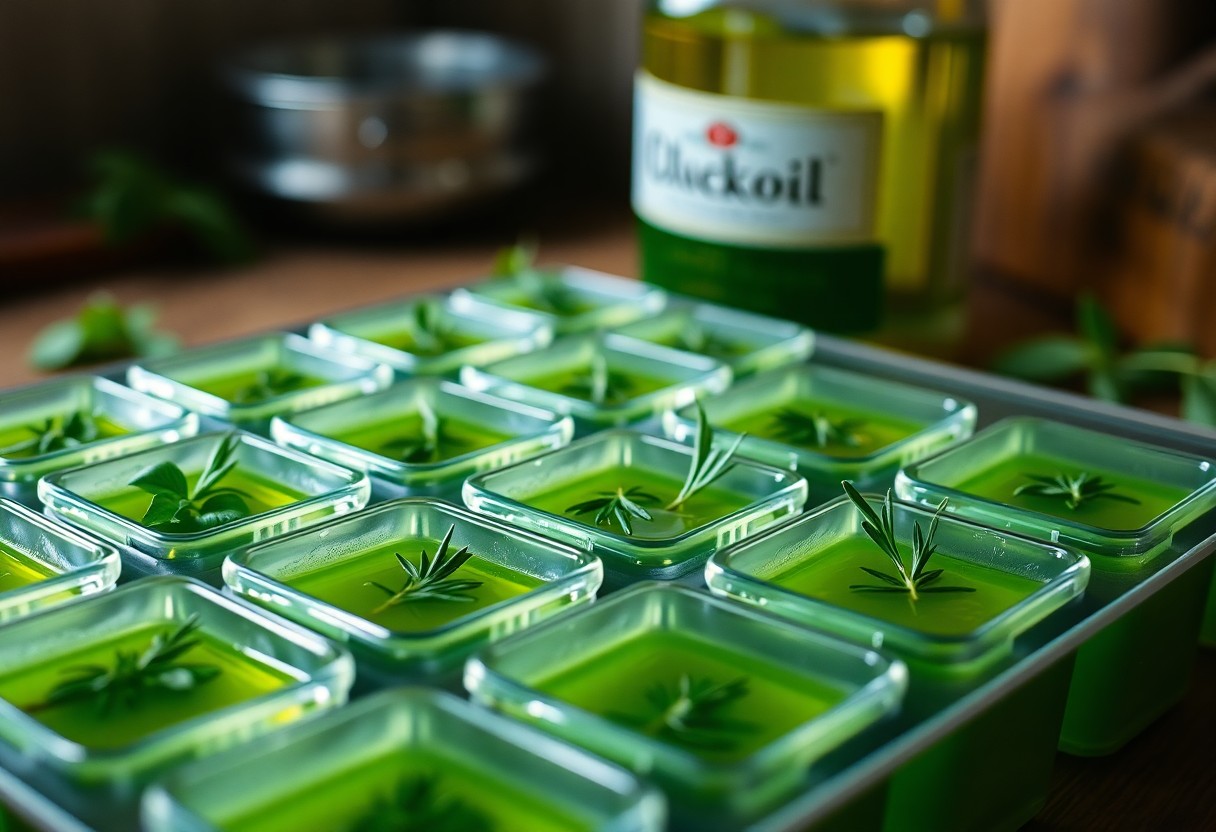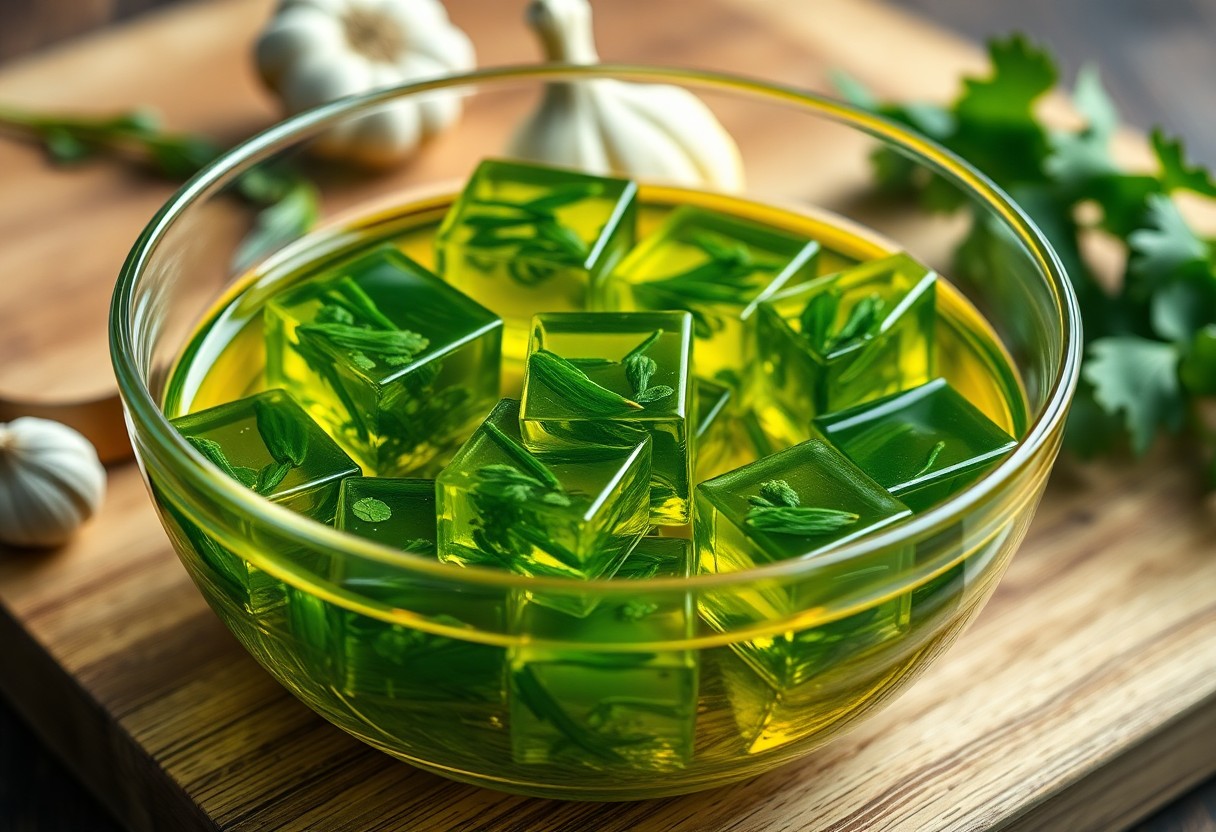Most people find themselves short on time but still crave flavorful meals. By freezing herbs in oil, you can create instant flavor bursts that elevate your dishes with minimal effort. Not only does this method preserve the freshness and potency of herbs, but it also allows you to enjoy homemade goodness at your convenience, transforming mundane recipes into culinary delights. In this post, you’ll discover simple techniques to make the most of your herbs and streamline your cooking on those busy days.

Key Takeaways:
- Freezing herbs in oil preserves their flavor and aroma, making it easy to incorporate fresh tastes into meals without the need for extensive prep time.
- This method allows for portion control, as you can freeze herbs in ice cube trays, enabling quick and convenient use in cooking whenever needed.
- By preparing and freezing herb-infused oil ahead of time, you can enhance dishes in a matter of minutes, making meal prep simpler and more efficient on busy days.
Elevating Everyday Cooking with Herb-Infused Oils
Integrating herb-infused oils into your cooking not only enhances the depth of flavor in your dishes but also simplifies meal preparation. By having ready-made blends on hand, you instantly boost the taste profile of simple meals, from drizzling over grilled vegetables to enriching pasta sauces. The versatility of these infused oils permits fast flavor enhancement in various cuisines, allowing you to whip up gourmet experiences in mere moments.
The Art of Flavor Extraction
Flavor extraction is the key technique behind creating aromatic herb-infused oils. When you infuse oil with fresh herbs, the natural oils and compounds from the herbs slowly dissolve into the carrier oil, resulting in a concentrated flavor profile. The process often involves gently heating the herbs, which helps unlock their vital oils while preserving their unique characteristics.
Essential Oils and Their Culinary Benefits
Herbs like basil, rosemary, and thyme contain vital oils that provide not only flavor but also beneficial properties. These oils can enhance digestion, promote anti-inflammatory effects, and even provide antioxidants, making your meals healthier as well as tastier. By incorporating herb-infused oils into your cooking, you can utilize these benefits in every bite.
For instance, rosemary vital oil is known for its potential to improve digestion and support cognitive function. Similarly, basil boasts antibacterial and anti-inflammatory properties, while thyme promotes respiratory health. By freezing these aromatic herbs in oil, you not only preserve their flavors but also harness their health benefits, creating a delicious and nutritious addition to your busy kitchen routine.
The Step-by-Step Process: Freezing Herbs in Oil
| Step | Description |
| 1. Selecting Herbs and Oils | Choose fresh, aromatic herbs and high-quality oils that complement each other. |
| 2. Preparing Ingredients | Wash and dry herbs thoroughly. Chop them to release their crucial oils. |
| 3. Mixing | Combine chopped herbs with the oil, ensuring the herbs are fully submerged. |
| 4. Freezing | Pour the mixture into ice cube trays or muffin tins and freeze until solid. |
| 5. Storing | Transfer frozen cubes into zip-lock bags for long-term storage and label them. |
Selecting the Right Herbs and Oils
Choose herbs that are resilient, flavor-packed, and commonly used in cooking, such as basil, parsley, or rosemary. Pair with oils that enhance those flavors, like olive oil for Mediterranean dishes or sesame oil for Asian cuisine. Your selections should not only reflect your personal taste but also complement the meals you typically prepare.
Preparing, Mixing, and Freezing Techniques
Preparation includes cleaning and chopping your herbs to maximize flavor release. Combine the herbs with oil in a bowl, using a ratio of about one part herbs to two parts oil to ensure even infusion. Once mixed, pour the blend into an ice cube tray or muffin tin, allowing for easy portioning. Freeze until solid, which typically takes a few hours, and store in airtight containers to maintain quality.
To perfect your herb-infused oil cubes, aim for a fine chop to release crucial oils and flavors, enhancing your finished product. Using a high-quality oil is key; consider infusing oils such as extra virgin olive or avocado oils, both known for their health benefits and versatility. Once frozen, sealing the cubes in airtight bags keeps them fresh for up to six months, ready to elevate your meals with just a quick toss into your pan or dish.

Creative Ways to Incorporate Herb-Infused Oils
Using herb-infused oils in your cooking can dramatically elevate the flavors of your homemade dishes without adding extra time or complexity. These oils are versatile and can be used in various preparations, from simple sautéing to sophisticated drizzling. You’ll love discovering new ways to enhance your favorite meals and impress your family or guests with an expert touch.
Enhancing Sauces and Dressings
Incorporate herb-infused oils into your sauces and dressings for an aromatic boost that transforms ordinary into extraordinary. Just a teaspoon of basil-infused oil can turn a basic marinara sauce into a delightful culinary experience, while rosemary oil can amplify the richness of creamy dressings. A drizzle of these oils not only enhances flavor but also adds an appealing sheen, making your dishes more visually enticing.
Infusing Daily Meals: From Breakfast to Dinner
Infused oils are perfect for elevating everyday meals, allowing you to incorporate gourmet flavors effortlessly throughout the day. Whether you’re sautéing vegetables for breakfast or drizzling over roasted meats for dinner, herb oils add depth and dynamic flavors that can make any meal feel special.
Start your day with a splash of garlic-infused olive oil on scrambled eggs, creating a savory twist on a classic dish. For lunch, toss a simple salad with a vinaigrette enhanced by lemon-thyme oil, brightening each bite. As dinner rolls around, use an herb-infused oil to finish off grilled meats or vegetables—adding a splash of flavor while maximizing the rich aromas that fill your kitchen. The beauty of using these oils is their simplicity; just a quick drizzle or a splash can take your meals from mundane to marvelous in an instant.
Strategies for Storing and Using Herb-Infused Oils Effectively
Maximize the benefits of your herb-infused oils by selecting proper storage methods and employing them efficiently in your culinary creations. You can enhance flavors in your dishes with ease by utilizing appropriate containers, labeling, and placement strategies to keep your oils fresh and accessible. Planning ahead can make all the difference in how you incorporate these oils quickly into meals on busier days.
Shelf Life and Safety Considerations
The shelf life of herb-infused oils generally spans from two weeks to several months, depending on the ingredients used and how they’re stored. Maintaining a dark, cool environment helps prevent spoilage and the growth of harmful bacteria, especially when using fresh herbs. Always be wary of any off odors or signs of mold, which indicate that your oil should be discarded immediately for safety.
Tips for Quick and Easy Access
For quick access to your herb-infused oils during meal preparation, store them in easily reachable locations, such as your kitchen counter or spice rack. Utilizing clear, labeled bottles can help you instantly identify the flavor profile associated with each oil. Additionally, consider creating a dedicated shelf space that groups oils by herb or intended use for even faster selection.
- Clear, labeled bottles allow for swift identification of your oils.
- Store oils near your cooking area for easier access while preparing meals.
- Dedicating a shelf for oils by use ensures efficient organization.
- The incorporation of these simple strategies can significantly streamline your cooking process.
Setting aside time to prepare herb-infused oils in batches not only saves time but also provides flexibility in your cooking. By arranging them in a visually appealing manner, you enhance your kitchen space while making your oils easier to reach during hectic cooking sessions. Organizing them by flavor type or usage encourages more experimentation and enjoyment in your culinary ventures. The perfect oil is always at your fingertips when you invest a little extra effort into your storage strategy.
- Batching herb-infused oils can save valuable time on busy days.
- Visually appealing arrangements create a beautiful kitchen space.
- Organizing by flavor or usage inspires creative cooking opportunities.
- The effort you put into organizing your oils can transform your cooking experience.
The Time-Saving Benefits: Making Meals Efficiently Flavorful
Busy weeknights often call for quick meal solutions without sacrificing flavor. By using herb-infused oils, you can whip up delicious dishes in a matter of minutes. With just a drizzle of your prepared herb oil, a simple pasta, roasted vegetables, or grilled meats become outstanding culinary delights, saving you time in flavor development. This approach helps you streamline your cooking process while eliminating the need for extensive seasoning or multiple ingredients.
Meal Prep and Planning with Herb Oils
Integrating herb-infused oils into your meal prep can feel like having a secret weapon in your kitchen. Create a batch of herb oils on the weekend and store them in small containers for easy access throughout the week. Use them as bases for sauces, dressings, or marinades, transforming your planned meals into instant gourmet experiences when you’re low on time during the busy week.
Stories from Time-Pressed Cooks
Countless home cooks have discovered the magic of herb-infused oils during chaotic weeks. You’ll often hear stories of how a single bottle of basil-infused oil turned an ordinary roasted chicken into a family favorite or how thyme oil was the star of a serendipitous weeknight pasta dish. These snippets reflect the transformative power of having flavor-packed oils within arm’s reach.
Many time-pressed cooks share how herb-infused oils have become everyday staples in their kitchens. One busy mom recounted how a simple drizzle of lemon and rosemary oil over a baked fish dish elevated a last-minute dinner to something that felt special, impressing her family without demanding hours of preparation. Another story highlights a food blogger who kept basil-infused oil at hand, making quick stir-fries vibrant and full of flavor, allowing her to maintain her cooking passion even amidst her hectic schedule.
Summing up
Presently, freezing herbs in oil is an excellent method to ensure that you have instant flavors ready for your busy days. By preparing herbs in this way, you can easily enhance your dishes with fresh tastes without the need for extensive prep work. Simply scoop out what you need from the ice cube tray to add vibrant flavor to soups, sauces, and marinades, all while saving your valuable time. This simple technique allows you to maximize the shelf life of your herbs while keeping your cooking efficient and flavorful.
FAQ
Q: What is the process of freezing herbs in oil, and why is it beneficial?
A: Freezing herbs in oil involves blending fresh herbs with a neutral oil and then freezing the mixture in ice cube trays or other containers. This method not only preserves the flavor and nutrients of the herbs but also creates a quick and convenient way to add instant flavors to meals, especially on busy days when time is limited.
Q: Which herbs work best for freezing in oil?
A: Many herbs can be successfully frozen in oil, including basil, parsley, cilantro, rosemary, and thyme. Each herb brings its unique flavor profile, allowing for a variety of combinations to enhance your dishes. It’s best to choose herbs that you frequently use in your cooking to maximize their utility.
Q: How do I use the frozen herb-oil cubes in my cooking?
A: The frozen herb-oil cubes can be easily used in cooking by popping out one or two cubes and adding them directly to your pan while sautéing vegetables, meats, or during the cooking of sauces. They melt quickly, releasing the flavors of the herbs while also providing oil for cooking.
Q: Can I combine different herbs when freezing them in oil?
A: Yes, mixing different herbs in a single oil base can create unique flavor profiles. For instance, combining garlic with basil can create a delightful flavor that pairs well with pasta dishes. Experiment with your favorite herbs to discover combinations that best suit your taste.
Q: How long can frozen herb-oil cubes be stored, and how should they be stored?
A: Frozen herb-oil cubes can be stored for up to six months in an airtight container or resealable bag. It’s best to label the containers with the date and the herbs used to keep track of freshness. Ensure that the oil is completely covering the herbs to prevent freezer burn.
